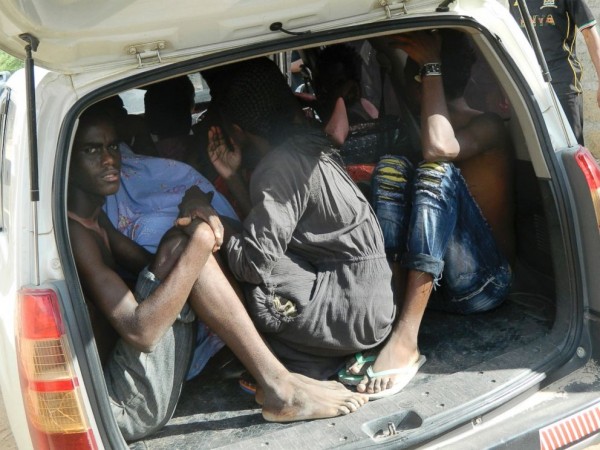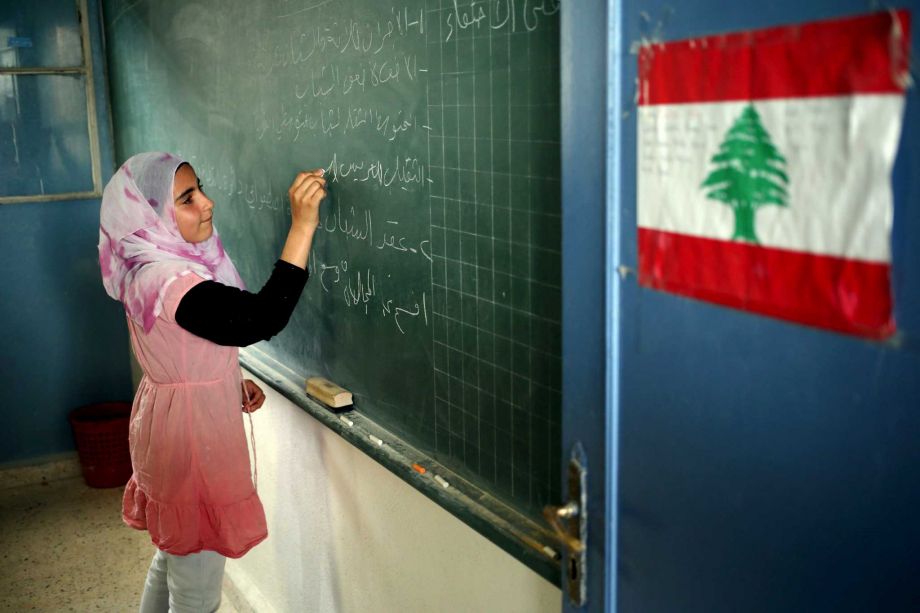

“I want to become a dentist. I have always been intrigued by the tools and materials dentists use in their neat clinics. Every time I visited my dentist in Syria, I learned something new,” she said.
In 2013, a shell hit her home in Aleppo and Tasnim lost her left hand. Nevertheless, she is determined to pursue her dreams and overcome the obstacles war and flight into exile suddenly threw across her path.”I want to keep learning. I want to help children have beautiful smiles,” she explained.
Tasnim arrived in Lebanon in 2014, one year after the shell attack, and managed to secure a spot in a local public school. She was fortunate, as in so doing she became one of only a quarter of school-aged children who had access to public schools.
She had been out of school for two years, but upon arrival in Lebanon, she was admitted in an Accelerated Learning Programme that proved very helpful in facilitating her later school enrolment. She completed the year with honours.
“Tasnim was an excellent student in Syria,” said Marwa, her mother: “my expectations of her were never humble, and they remain high despite her disability.”
This year, other children in Lebanon – both Lebanese and refugees – will have more opportunities to follow in Tasnim’s footsteps as they will now benefit from access to free education up to grade nine in Lebanese public schools.
This is a major change because education in Lebanon was mandatory but never free of charge even in public schools for the Lebanese children.
Parents had to pay fees of US $60 per child per year, in addition to the cost of books and stationary. This year, the Ministry of Education and Higher Education (“the Ministry”), UN agencies and various donors will cover all tuition fees for Lebanese and refugee children, the cost of schoolbooks and the cost of basic stationary.
With the support of US $94 million through UNHCR, UNICEF, the World Bank and bilateral donors, on September 21 the Ministry launched a nationwide ‘Back to School’ campaign to invite all parents to register their children in school.
The purpose of this joint initiative between the Ministry, UNHCR and UNICEF is to maximise access to certified education for all children on Lebanese territory.
This will allow 200,000 Syrian refugee children between the ages of three and 14 to access certified basic education – nearly double the 106,000 children reached last year.
UNHCR is particularly aiming to encourage children who have been out of school for over a year as well as children living with disabilities to integrate in the Lebanese educational system.
With refugees having exhausted their resources and savings, many refugee parents are left with no choice but to send their children to work. Over the past school year, some 6,000 families were forced to withdraw their children from school.
“Our priority is to identify out-of-school children and encourage their integration in Lebanese public schools”, said Mireille Girard, UNHCR Representative in Lebanon.
“At a time when refugees are facing increasing challenges in their daily lives, certified education for their children is much needed,” she added.
In order to ensure retention and school enrolment, UNHCR teams are working closely with refugee volunteers in raising awareness on the importance of education and in explaining the registration procedure to parents and children.
A number of Syrian refugee children face difficulties in keeping up with the Lebanese curriculum because of language barriers. In Lebanon, maths sciences are taught in either English or French, while in Syria, these are taught in Arabic. UNHCR is scaling up homework support groups to help children stay in school and overcome curriculum and language challenges.
The support to certified education also includes a pilot Accelerated Learning Program (ALP), regulated by the Ministry, to help children who have been out of school for over two years catch up in an intensive program of four months. Successful completion of an ALP certification leads to enrolment in a public school.
Places are allocated in both the regular shift, where Syrian refugees will have the chance to go to class alongside Lebanese children, and the second shift – specially designed to accommodate more Syrian children in schools.
A total of 1,278 public schools will manage the increased number of students, while another 259 schools– 115 more schools than last year – will provide the second shifts in the afternoon.
Close to 417,000 Syrian refugee children in Lebanon are aged between three and 14 years old, which is the age range targeted by the Back to School campaign. Despite the increase in places for Syrian refugees in schools this year, at least 200,000 Syrian refugee children will remain out of school, pending more opportunities in Lebanese public schools including vocational schools.
Current resources are not sufficient to reach all the targeted refugee children. An additional US $25 million are still needed to provide formal education to the remainder of the children the initiative aims to reach – 41,645 vulnerable refugee children of the 200,000 targeted.
By Nisreen Jaafar and Lisa Abou Khaled, Lebanon
UNHCR

Leave a Reply
You must be logged in to post a comment.